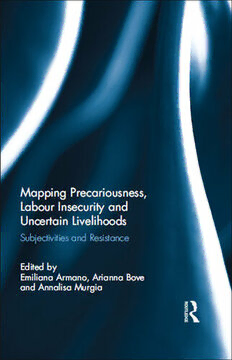
Mapping Precariousness, Labour Insecurity and Uncertain Livelihoods: Subjectivities and Resistance PDF
02017·0.558 MB·English
Most books are stored in the elastic cloud where traffic is expensive. For this reason, we have a limit on daily download.
Preview Mapping Precariousness, Labour Insecurity and Uncertain Livelihoods: Subjectivities and Resistance
Description:
The condition of precariousness not only provides insights into a segment of the world of work or of a particular subject group, but is also a standpoint for an overview of the condition of the social on a global scale. Because precariousness is multidimensional and polysemantic, it traverses contemporary society and multiple contexts, from industrial to class, gender, family relations as well as political participation, citizenship and migration. This book maps the differences and similarities in the ways precariousness and insecurity in employment and beyond unfold and are subjectively experienced in regions and sectors that are confronted with different labour histories, legislations and economic priorities. Establishing a constructive dialogue amongst different global regions and across disciplines, the chapters explore the shift from precariousness to precariat and collective subjects as it is being articulated in the current global crisis. This edited collection aims to continue a process of mapping experiences by means of ethnographies, fieldwork, interviews, content analysis, where the precarious define their condition and explain how they try to withdraw from, cope with or embrace it. This is valuable reading for students and academics interested in geography, sociology, economics and labour studies.
See more
The list of books you might like
Most books are stored in the elastic cloud where traffic is expensive. For this reason, we have a limit on daily download.
